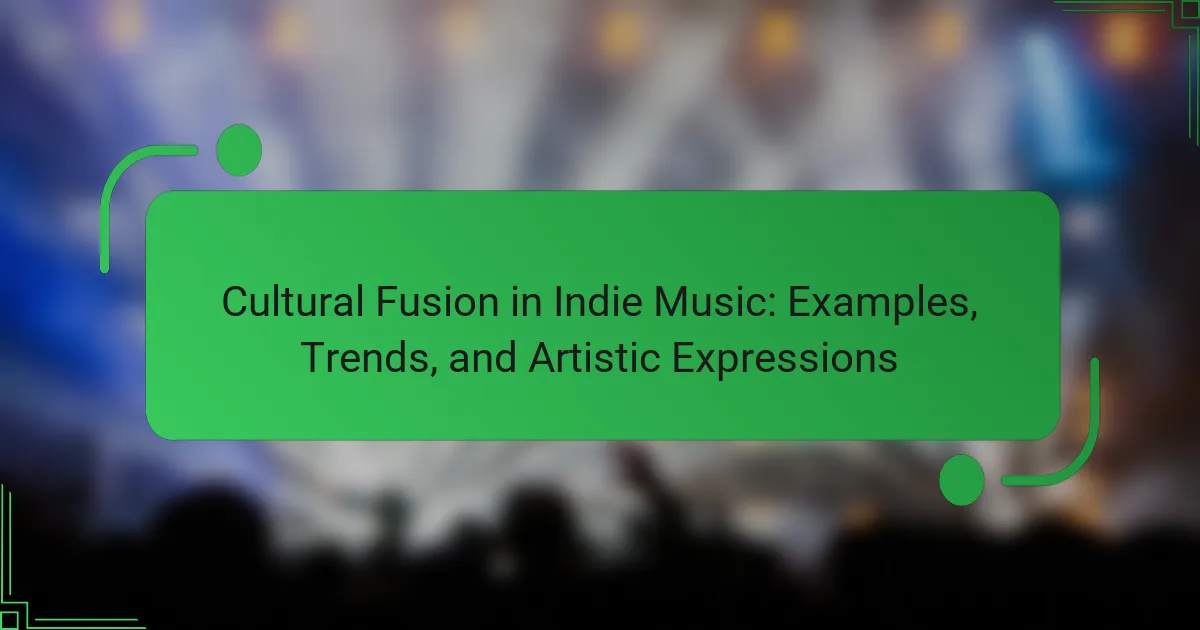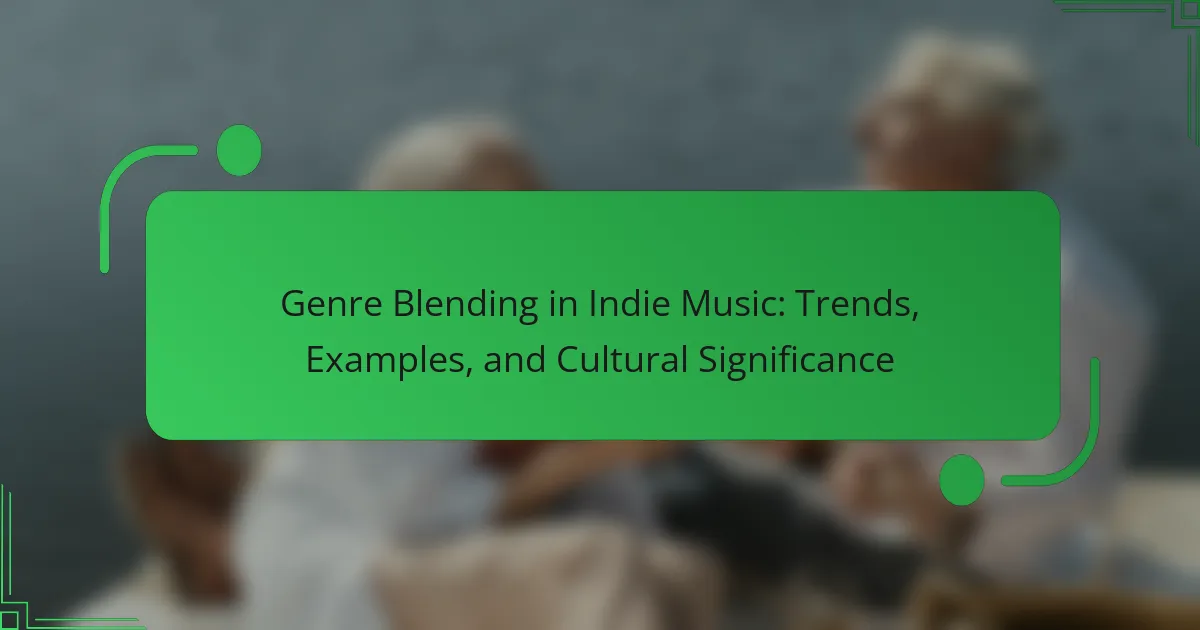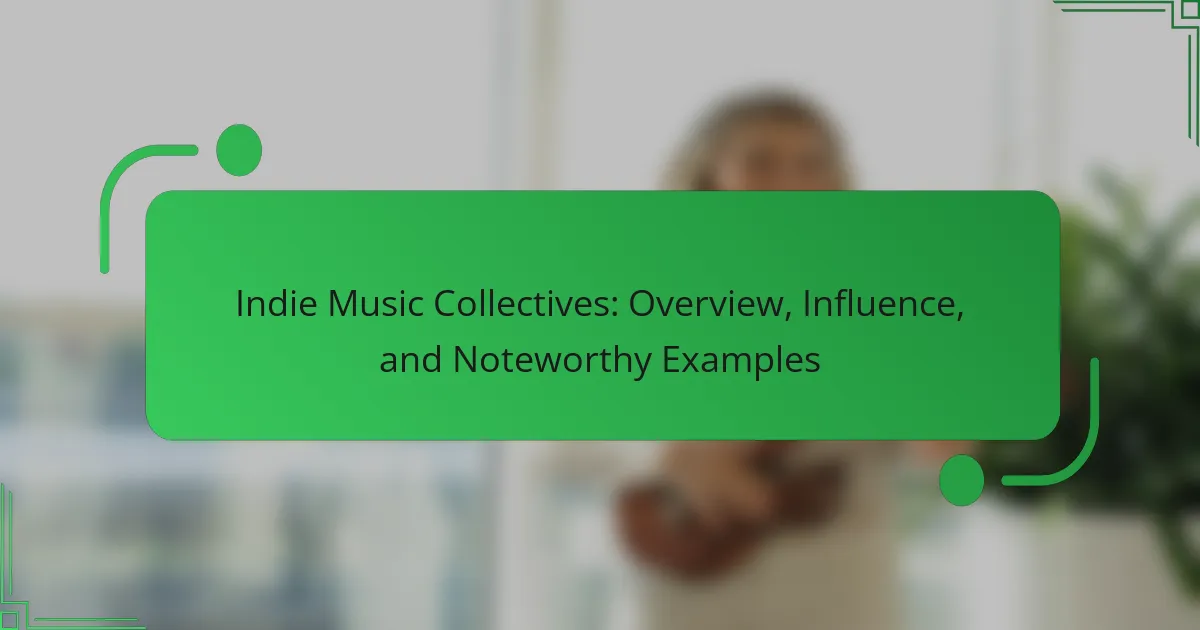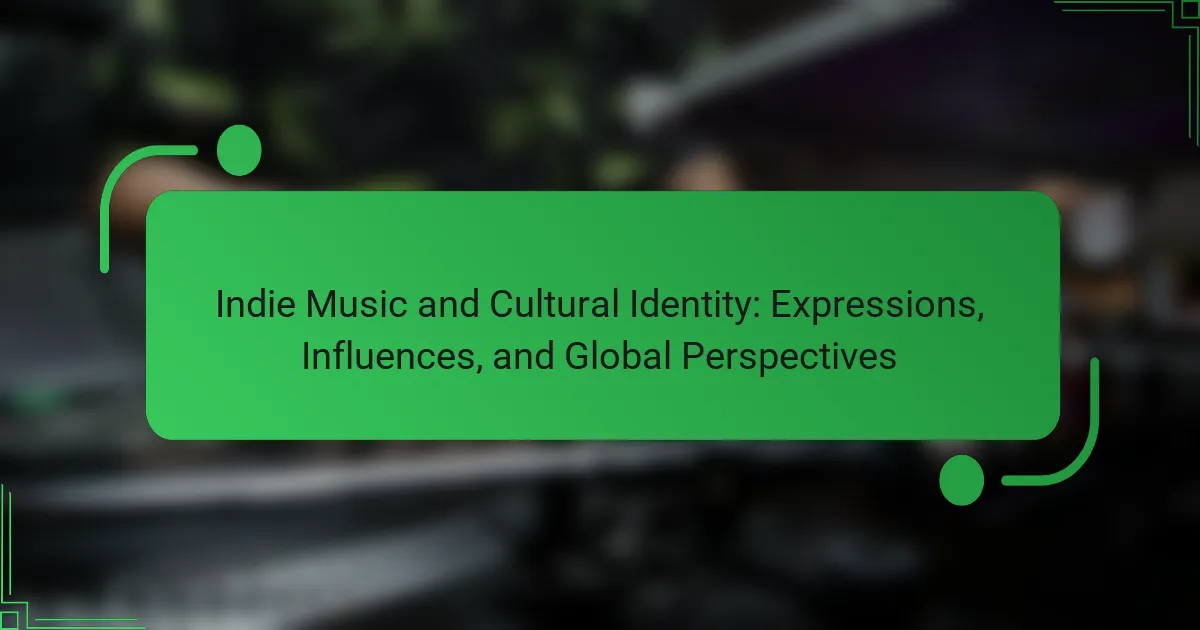Global indie music festivals offer unique experiences that celebrate independent artists and foster community engagement. This article explores notable festivals like Coachella and Glastonbury, highlighting their cultural significance and economic impact. It also addresses the challenges organizers face, innovative trends in sustainability, and the importance of cultural exchange at these events. Finally, practical tips are provided for attendees to enhance their festival experience.
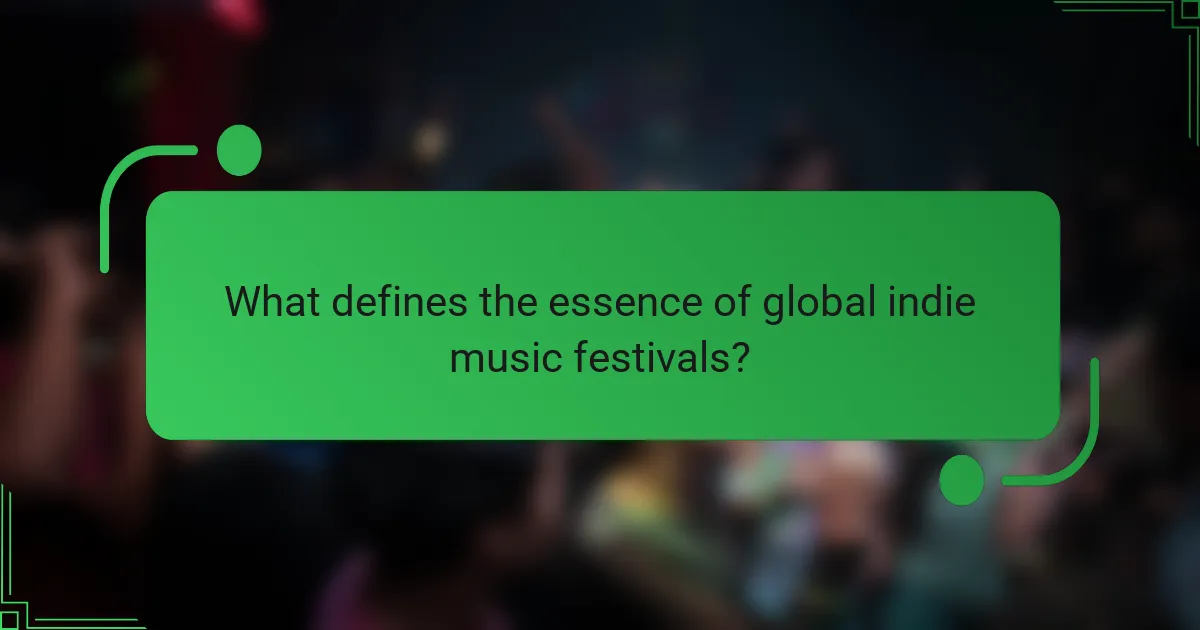
What defines the essence of global indie music festivals?
Global indie music festivals are defined by their diverse lineups, unique venues, and cultural impact. They celebrate independent artists while fostering community and creativity. Notable festivals like Coachella and Glastonbury attract global audiences, showcasing a range of genres and promoting emerging talent. These festivals often emphasize sustainability and local culture, enhancing their significance within the music industry.
How do cultural influences shape the festival experience?
Cultural influences significantly shape the festival experience by enhancing community engagement and enriching artistic expressions. Festivals often reflect local traditions, music styles, and social values, creating a unique atmosphere. For instance, the fusion of diverse musical genres at global indie festivals showcases cultural diversity, attracting varied audiences. This blend fosters collaboration among artists and promotes cross-cultural understanding, making the festival a platform for cultural exchange and celebration.
What are the common features of indie music festivals worldwide?
Global indie music festivals share common features that enhance their cultural significance. These festivals often emphasize diverse music genres, featuring both emerging and established artists. Many festivals take place in unique outdoor locations, creating immersive experiences for attendees. Community engagement is a vital aspect, fostering connections among artists and fans. Sustainability practices are increasingly prioritized, reflecting a commitment to environmental responsibility. Additionally, many festivals incorporate local food and art, enriching the overall cultural experience.
Why do indie music festivals attract diverse audiences?
Indie music festivals attract diverse audiences due to their inclusive atmosphere and eclectic lineups. These events often feature a mix of genres, fostering a sense of community among attendees. Festivals like Coachella and Glastonbury showcase artists from various cultural backgrounds, appealing to a wide demographic. Additionally, the communal experience of live music enhances social interactions, drawing people from different walks of life. This cultural significance and variety in performances contribute to the festivals’ broad appeal.
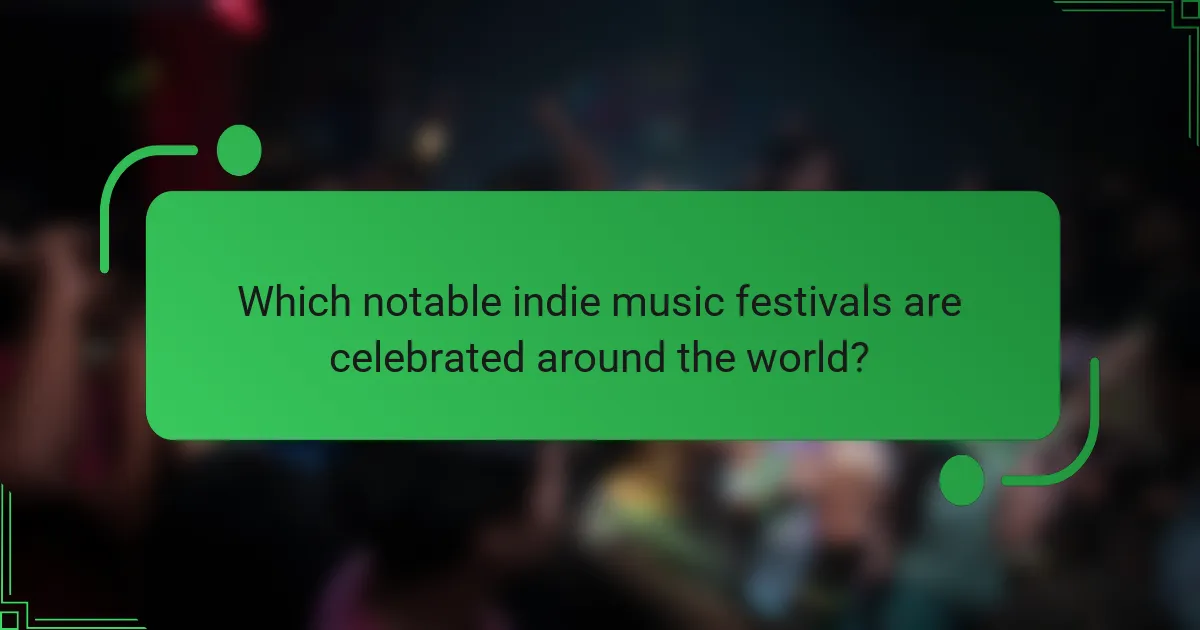
Which notable indie music festivals are celebrated around the world?
Notable indie music festivals celebrated around the world include Primavera Sound in Spain, South by Southwest (SXSW) in the United States, and Glastonbury in the UK. These festivals showcase emerging artists and foster cultural exchange. Primavera Sound features diverse lineups and attracts over 200,000 attendees annually. SXSW combines music, film, and interactive media, drawing thousands to Austin each year. Glastonbury is renowned for its iconic performances and community spirit, making it a unique cultural landmark.
What unique characteristics set each festival apart?
Each festival showcases unique characteristics that reflect its cultural roots and artistic vision. For instance, the Glastonbury Festival in the UK emphasizes sustainability and social activism, while Coachella in the US focuses on high-profile celebrity appearances and fashion trends. The Sziget Festival in Hungary is known for its diverse lineup and vibrant atmosphere, attracting a mix of international artists and attendees. In contrast, the Primavera Sound in Spain highlights indie music and emerging talent, creating an intimate experience for fans. Each festival’s distinctiveness stems from its location, community engagement, and the specific genres it promotes.
How do festival locations enhance the overall experience?
Festival locations significantly enhance the overall experience by providing unique cultural backdrops and immersive environments. These settings contribute to the festival’s atmosphere and influence the audience’s engagement. For example, a festival in a historic city can deepen the cultural significance, while a natural landscape can create a sense of connection with the music. Such locations often feature local cuisine and art, enriching the experience further. Ultimately, the choice of location can transform a music festival into a memorable cultural event.
What role do local artists play in international festivals?
Local artists play a crucial role in international festivals by enriching cultural diversity and fostering community engagement. They provide unique perspectives that highlight regional sounds and styles, enhancing the festival’s authenticity. Their participation often attracts local audiences, creating a bridge between global acts and local culture. This integration helps to promote cultural exchange, encouraging collaboration among artists from different backgrounds. Additionally, local artists can gain exposure on an international platform, which can lead to broader opportunities in the music industry.
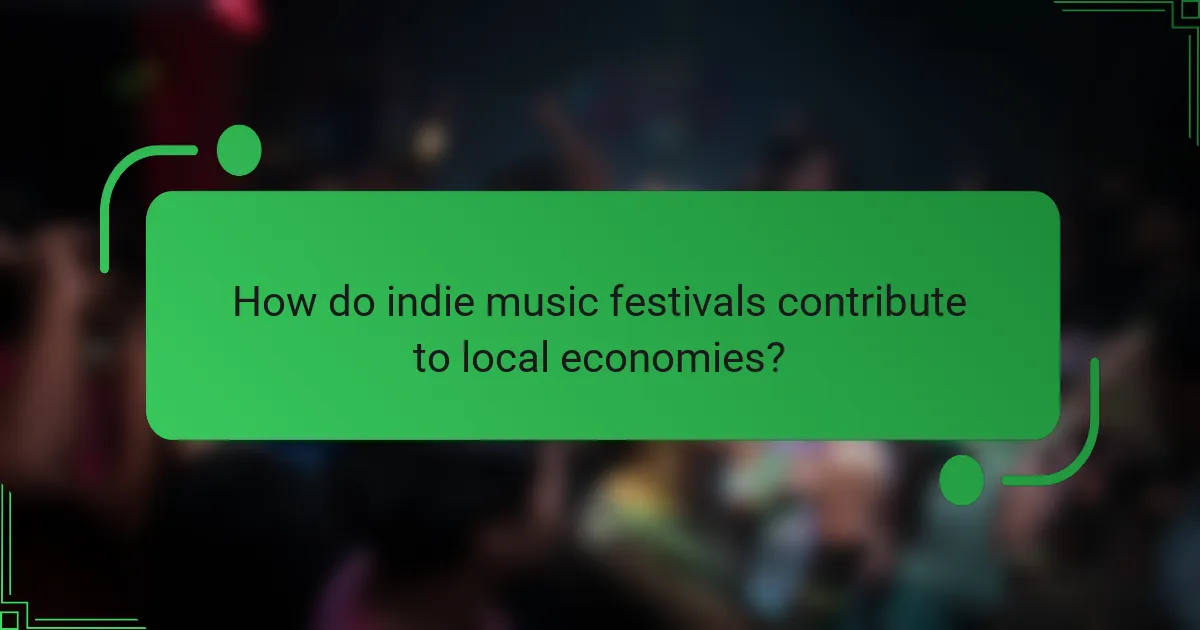
How do indie music festivals contribute to local economies?
Indie music festivals significantly boost local economies through increased tourism, job creation, and local spending. These events attract visitors who spend on accommodations, food, and entertainment, resulting in substantial economic impact. For instance, festivals like Coachella and Glastonbury generate millions in revenue, benefiting surrounding businesses. Additionally, they create temporary jobs in event management, hospitality, and security, contributing to community employment. The cultural significance of these festivals fosters local pride and enhances the region’s appeal as a destination for future events.
What are the economic benefits for host cities?
Global indie music festivals provide significant economic benefits for host cities, including increased tourism, job creation, and local business revenue. These events attract diverse audiences, boosting hotel occupancy and restaurant patronage. For instance, festivals can generate millions in direct spending, enhancing the city’s profile as a cultural destination. Additionally, they foster community engagement and support the local arts scene, contributing to long-term economic vitality.
How do festivals support local businesses and tourism?
Festivals significantly boost local businesses and tourism by attracting visitors and generating revenue. They create demand for accommodations, dining, and local services. For instance, a festival can increase hotel bookings by up to 70%, benefiting the hospitality sector. Additionally, local vendors gain exposure, leading to increased sales. Festivals often showcase regional culture, enhancing the area’s appeal and encouraging repeat visits. As a result, communities experience economic growth and cultural exchange, fostering a vibrant local economy.
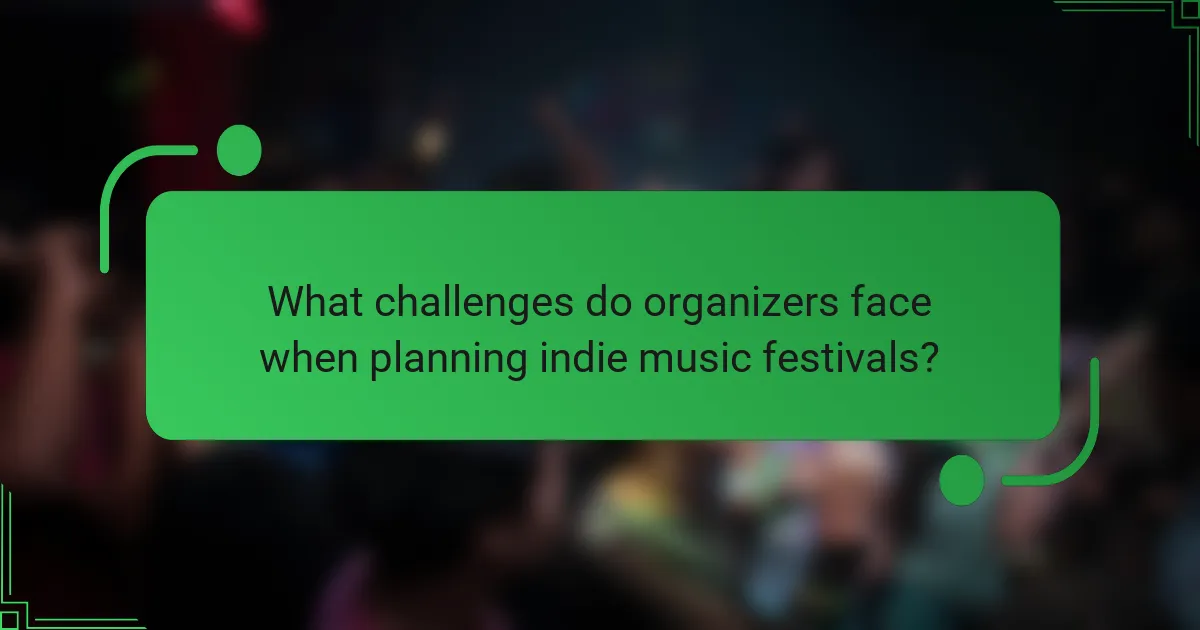
What challenges do organizers face when planning indie music festivals?
Organizers face numerous challenges when planning indie music festivals, including budget constraints, venue selection, and artist coordination. Securing sponsorships is often difficult, impacting financial stability. Additionally, managing logistics such as sound equipment and crowd control can be complex. Weather unpredictability can also disrupt plans, affecting attendance and overall experience. Lastly, marketing effectively to reach target audiences poses a significant hurdle, especially in a crowded festival landscape.
How do logistical issues impact festival success?
Logistical issues significantly affect festival success by disrupting planning, attendance, and overall experience. Poor transportation, inadequate facilities, and insufficient staffing can lead to delays and dissatisfaction. Effective logistics ensure smooth operations, enhancing attendee enjoyment and safety. Festivals with strong logistical frameworks often see higher attendance and positive reviews.
What are the common regulatory hurdles for festival organizers?
Festival organizers often face regulatory hurdles such as permits, safety regulations, and noise ordinances. These challenges can vary significantly based on location and local laws. For example, obtaining a public gathering permit may require extensive documentation, including site plans and insurance certificates. Additionally, compliance with health and safety regulations is essential to ensure the well-being of attendees. Noise ordinances can also impact event scheduling and sound levels, necessitating careful planning. Understanding these requirements is crucial for successful festival management.
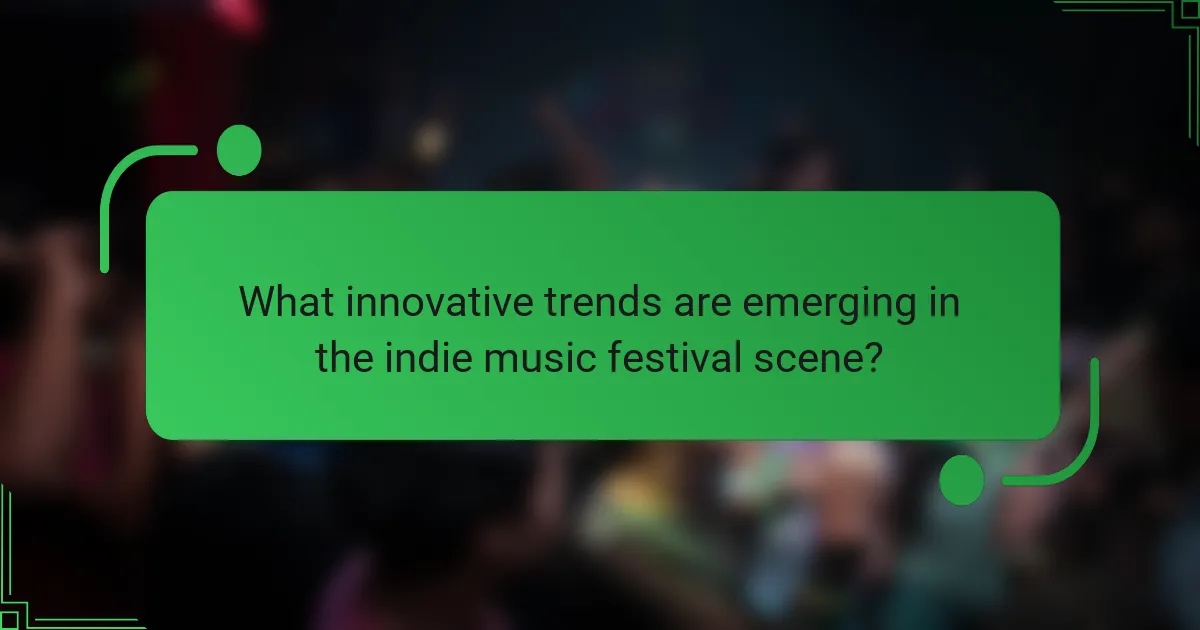
What innovative trends are emerging in the indie music festival scene?
Innovative trends in the indie music festival scene include a focus on sustainability, diverse lineups, and immersive experiences. Festivals are increasingly prioritizing eco-friendly practices, such as waste reduction and renewable energy sources. Additionally, many events are showcasing a broader range of genres and artists, promoting inclusivity. Unique attributes like virtual reality experiences and interactive art installations are enhancing audience engagement. Festivals are also leveraging technology for improved accessibility and personalized experiences, reflecting the changing landscape of live music events.
How is technology transforming the festival experience?
Technology is enhancing the festival experience through innovative engagement tools and improved logistics. Live streaming allows global audiences to participate remotely, expanding reach. Mobile apps provide real-time updates on schedules, artist lineups, and venue maps. Cashless payment systems streamline transactions, enhancing convenience. Social media amplifies community interaction and promotes festival culture. Additionally, augmented reality enriches on-site experiences, allowing attendees to engage with immersive content. These advancements collectively elevate the cultural significance of global indie music festivals, making them more accessible and interactive.
What sustainability practices are being adopted by festivals?
Many festivals are adopting sustainability practices to reduce their environmental impact. These include waste reduction initiatives, utilizing renewable energy sources, promoting eco-friendly transportation, and encouraging local food sourcing.
For example, some festivals implement comprehensive recycling and composting programs to minimize waste. Others are transitioning to solar power for energy needs, which significantly lowers carbon emissions. Additionally, many festivals partner with local farms to provide fresh, organic food options, supporting the local economy and reducing transportation emissions.
These practices not only enhance the festival experience but also raise awareness about sustainability among attendees, making a positive cultural impact.
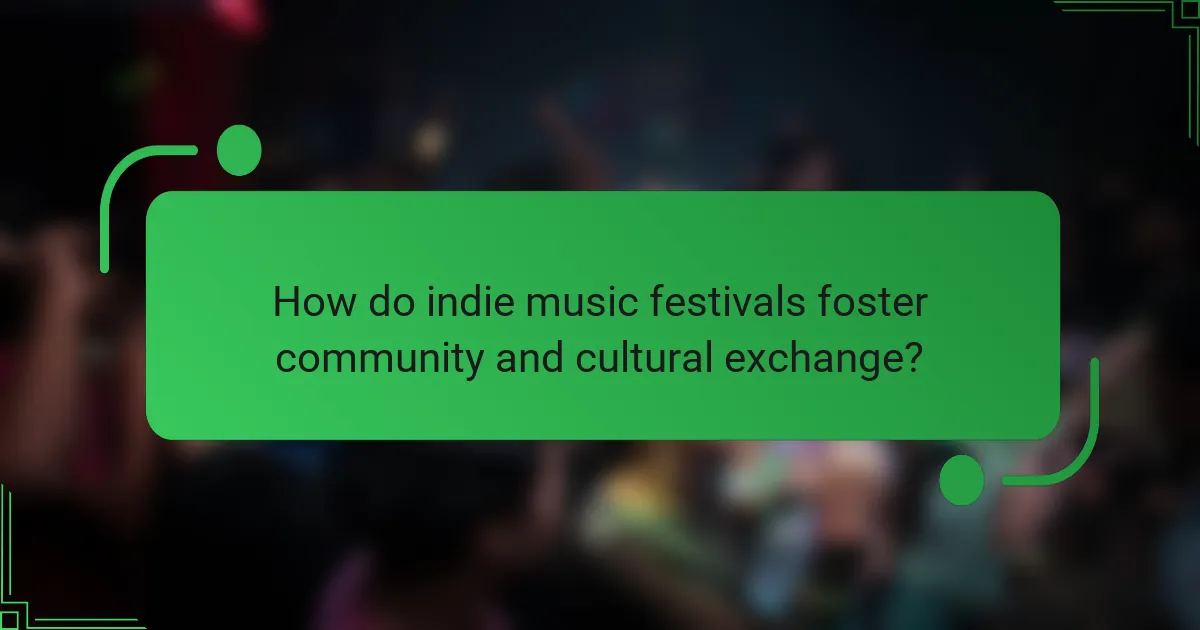
How do indie music festivals foster community and cultural exchange?
Indie music festivals foster community and cultural exchange by bringing diverse audiences together through shared musical experiences. These events celebrate local and global talent, creating platforms for collaboration and interaction among artists and attendees.
Festivals often feature workshops, discussions, and art installations that encourage cultural dialogue. For instance, events like South by Southwest in Austin and Primavera Sound in Barcelona highlight various genres and cultural expressions, enhancing mutual understanding.
The unique atmosphere of indie music festivals promotes inclusivity and connection. Attendees from different backgrounds engage in meaningful conversations, forging friendships that transcend geographical boundaries. This cultural exchange enriches local communities and fosters a global appreciation for indie music.
What initiatives promote inclusivity and diversity at festivals?
Global indie music festivals promote inclusivity and diversity through various initiatives. Many festivals implement programs that highlight underrepresented artists, ensuring a diverse lineup that reflects different cultures and backgrounds. Festivals often feature workshops and discussions on social issues, fostering an inclusive environment. Additionally, partnerships with local organizations enhance accessibility for marginalized communities. Some festivals provide scholarships or grants to support emerging artists from diverse backgrounds, promoting equal opportunities in the music industry. These initiatives contribute to the cultural significance of festivals, making them platforms for social change and representation.
How do festivals serve as platforms for social issues?
Festivals serve as platforms for social issues by raising awareness, fostering community engagement, and promoting dialogue. Global indie music festivals often highlight themes like environmental sustainability, social justice, and mental health. For instance, events like Glastonbury incorporate eco-friendly practices and advocate for climate action. Additionally, festivals provide a space for marginalized voices, amplifying their messages through music and art. This cultural significance enhances social connectivity and encourages collective action among diverse audiences.
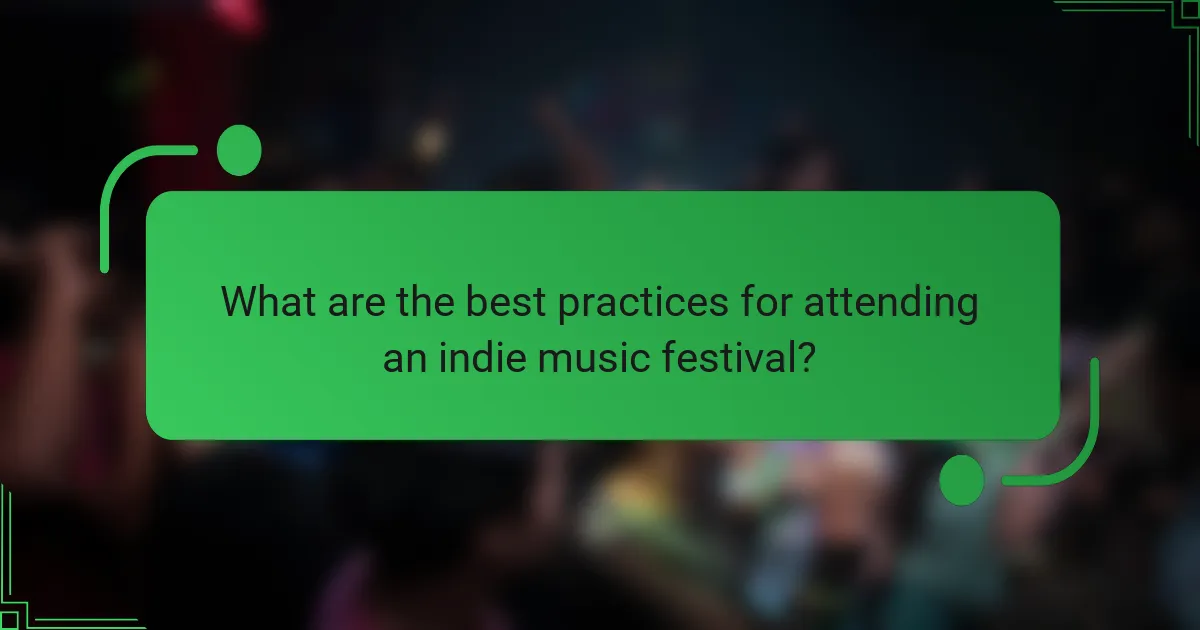
What are the best practices for attending an indie music festival?
To enjoy an indie music festival fully, plan ahead, stay hydrated, and embrace the community spirit. Research the lineup, set a budget, and prepare for varying weather conditions. Arrive early to secure a good spot and explore the festival grounds. Engage with local vendors and artists to enrich your experience. Prioritize safety and respect the venue’s rules for a memorable time.
How can attendees enhance their festival experience?
Attendees can enhance their festival experience by immersing themselves in the music, exploring local cultures, and engaging with artists. Arriving early allows for better access to performances and activities. Networking with fellow festival-goers can lead to new friendships and shared experiences. Participating in workshops or panels provides deeper insights into the music scene. Lastly, documenting the experience through photos and social media can create lasting memories and connections.
What common mistakes should festival-goers avoid?
Festival-goers should avoid common mistakes that can detract from their experience. First, neglecting to plan ahead can lead to missing key performances. Second, failing to stay hydrated and nourished can result in fatigue. Third, not wearing appropriate clothing or footwear can cause discomfort. Lastly, ignoring festival rules and guidelines can lead to unnecessary issues.
